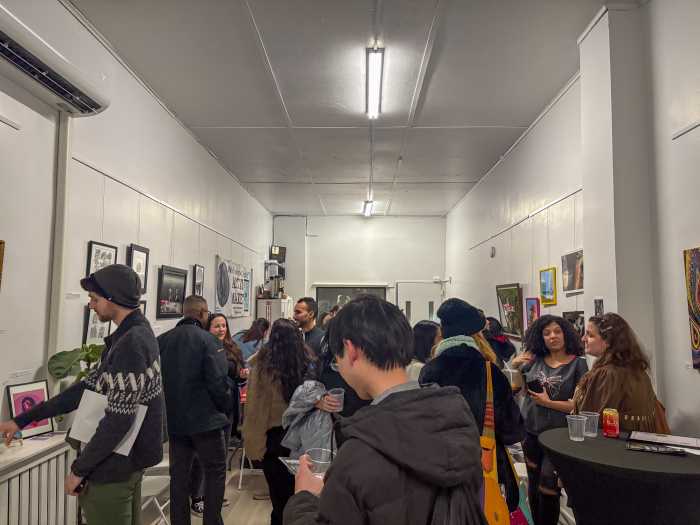Dozens of Queens small business owners and some elected officials called on the city and state to enact policies that may save small businesses throughout New York City from economic collapse on Thursday, Sept. 10.
The rally, held next to Katch Astoria on 31-19 Newtown Ave., was the latest of several efforts by Queens’ small business owners who are fighting for real relief by lawmakers amid the economic crisis that resulted from the COVID-19 pandemic.
The businesses presented a list of demands that included immediate commercial rent relief, a concrete plan for indoor dining and future operations, as well as legislation to require insurance companies pay small businesses what they’re owed in insurance claims.
Roseann McSorley, owner of Katch Astoria and a business leader in the community, said fellow small businesses in Astoria and the rest of the city are “closing by the day,” which will only lead to “sky-high” unemployment rates.
New York City is facing unemployment rates of up to 20 percent, which mostly impacts low-income workers of color, since the pandemic forced the state to go on lockdown in March, according to a report by the Center for New York City Affairs.
“Astoria will not be what it was before,” she said. “It’s not about the business owners and whether we’re making money, because we’re not — it’s about the people we employ and making sure they have places to come to work and food to eat.”
Frank Arcabascio, president of the 30th Avenue’s Business Association, said 10 percent of businesses on the commercial corridor aren’t working. They’re projecting about 60 percent of small businesses will be gone in six months to a year.
Many restaurant and bar owners at the rally said that while they were glad Gov. Andrew Cuomo heard their pleas to bring back indoor dining at some capacity on Sept. 30, they said 25 percent won’t be of much help.
Tina Oppedisano, manager of Il Bacco, was there to speak about her Little Neck restaurant that made headlines last week for filing a $2 billion dollar class action lawsuit against Cuomo, Mayor Bill de Blasio and the attorney general’s office for not allowing indoor food service while neighboring counties ensued service at 50 percent capacity. Their lawsuit had more than 350 restaurants signed on at the time, a number which has grown to 900.
“This just goes to show you after causing some attention and bringing up a flare, eight days after bringing attention to this injustice Gov. Cuomo finally responded,” said Oppedisano. “I don’t want to sound unappreciative, but I absolutely do not consider this a victory. It is a step moving forward, but it is not a victory.”
Oppedisano said Cuomo and de Blasio’s guidelines for indoor dining — tables six feet apart, all patrons will have their temperatures checked at the door and must wear masks when they are not at their table, changing air filtration system — are “outlandish.”
Il Bacco’s manager/owner Tina Oppedisano joined the rally & said that although Gov. Cuomo finally announced indoor dining at 25% capacity, “this is not a victory.”
“This fight is not nearly over,” she said. There are now 900+ restaurants who have signed onto their $2B lawsuit. pic.twitter.com/A7OVisYqwM
— Angélica M. Acevedo (@angacevedo15) September 10, 2020
At the rally, several western Queens lawmakers and candidates for office were there to support local business owners, including state Senators Michael Gianaris and Jessica Ramos, Councilmen Donovan Richards and Jimmy Van Bramer, Councilman Costa Constantinides’ Chief of Staff Nick Roloson and Astoria Assembly candidate Zohran Mamdani.
Senator Gianaris spoke about his bill to forgive commercial and residential rent, one of the main issues businesses face. Senator Ramos spoke about holding the New York State Liquor Authority accountable for the influx of fines and liquor license removals by the agency, emphasizing that government should give small businesses resources and guidance to create work, not tear them down.
Mamdani spoke about one of the demands of the local businesses: a vacancy tax.
“We have people here who have not been able to sustain their businesses, but because there’s the prospect of kicking them out, of keeping these lots vacant for years with no penalty, and simply bringing in the Targets, bringing in all kinds of multi-national groups to take over our neighborhoods — we have to say that is not going to happen,” said Mamdani.
Van Bramer said arts and culture organizations have been forgotten throughout reopening talks. He spoke about his legislation to allow them to operate outdoors, much like outdoor dining. Sheila Lewandowski, executive director of Long Island City’s Chocolate Factory Theater, said the arts contribute 7 percent to the state’s GDP, but they were “first to shutdown, last to open.”
Sheila Lewandowski of Chocolate Factory Theater said arts & culture spaces were the “first to shutdown, last to reopen.”
She spoke abt artists leaving because their jobs are gone & they can’t afford rent. She also mentioned Canada’s rent relief program: https://t.co/FBxVjVdNcX pic.twitter.com/etTrEa0J9B
— Angélica M. Acevedo (@angacevedo15) September 11, 2020
Richards spoke about his bill that just passed in the City Council that would mandate the Department of Small Business Services to disclose which businesses received a loan or grant from the New York City Employee Retention Program or the New York City Small Business Continuity Loan Fund, two COVID-19 relief programs the department administers.
He said they found 57 percent of those loans and grants went to Manhattan businesses, while 19 percent went to Queens businesses.
“It’s shameful being that we are the second largest contributor to the economy, not to mention we have two airports,” said Richards. “That was 20 million dollars that went to Manhattan. Manhattan is not the center of New York City; the outer boroughs is where we’re seeing rapid growth.”
Jamie-Faye Bean, executive director of Sunnyside Shines Business Improvement District and co-founder of Queens Together, said small businesses respond to community “like nobody else.”
“The PPP money has run out, if it was ever there in the first place — you don’t understand how many business owners I work with that didn’t even meet eligibility requirements for a lot of the relief that has been offered for the past few months,” said Bean. “The employees laid off are gone, moved out of the city. We are now in a race to the bottom and it needs to stop.”




































